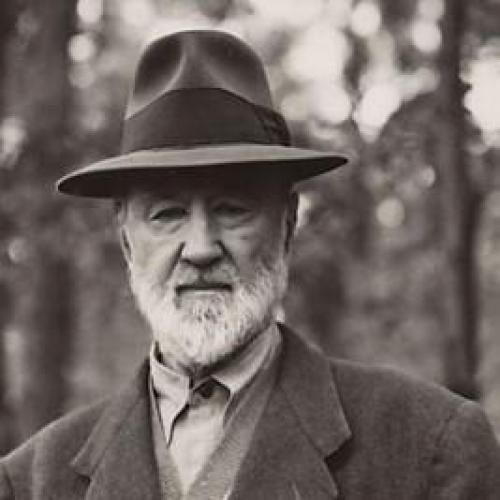Charles Ives - The Greatest Man
About some great man, so I thought last night
'n thought about heroes and men
That had done great things
'n then I got to thinkin' 'bout my pa;
He ain't a hero 'r anything but pshaw!
Say! He can ride the wildest hoss
'n find minners near the moss
Down by the creek; 'n he can swim
'n fish, we ketched five new lights, me 'n him!
Dad's some hunter too - oh, my!
Miss Molly Cottontail sure does fly
When he tromps through the fields 'n brush!
(Dad won't kill a lark 'r thrush.)
Once when I was sick 'n though his hands were rough
He rubbed thе pain right out. "That's the stuff!"
He said when I winkеd back the tears. He never cried
But once 'n that was when my mother died
There're lots o' great men: George Washinton 'n Lee
But Dad's got 'em all beat holler, seems to me!
Song Description:
edit soundcloudSoundCloud:
edit soundcloudMore Charles Ives lyrics
Charles Ives - Nov. 2, 1920
"It strikes me that some men and women got tired of a big job; But, over there our men did not quit They fought and died that better things might be! Perhaps some who stayed at
Charles Ives - Premonitions
There's a shadow on the grass That was never there before And the ripples as they pass Whisper of an unseen oar; And the song we knew by rote Seems to falter in the
Charles Ives - From "The Swimmers"
Then the swift plunge into the cool green dark The windy waters rushing past me, through me; Filled with the sense of some heroic lark Exulting in a vigor clean and roomy Swiftly
Charles Ives - Cradle-Song
Hush thee, dear child to slumbers; We will sing softest numbers; Nought thy sleeping encumbers Summer is slowly dying; Autumnal winds are sighing; Faded leaflets are
Charles Ives - The Camp-Meeting
Across the summer meadows fair There comes a song of fervent prayer; It rises radiantly o'er the world Exulting, exulting, in the power of God! Exalting Faith in life above
Charles Ives - In Flanders Fields
In Flanders fields the poppies blow; Between the crosses, row on row That mark our place; and in the sky The larks still bravely singing fly Scarce heard amidst the guns below
Charles Ives - He Is There!
Fifteen years ago today A little Yankee, little yankee boy Marched beside his granddaddy In the decoration day parade The village band would play Those old war tunes And
Charles Ives - Tom Sails Away
Scenes from my childhood are with me I'm in the lot behind our house upon the hill A spring day's sun is setting Mother with Tom in her arms Is coming towards the
Charles Ives - Old Home Day
Go my songs! Draw Daphnis from the city A minor tune from Todd's opera house Comes to me as I cross the square, there We boys used to shout the songs that rouse The
Charles Ives - In the Alley
On my way to work one summer day Just off the main highway Through a window in an alley Smiled a lass, her name was Sally O could it be! O could it be she smiled on me!
YouTube
Charles Ives
